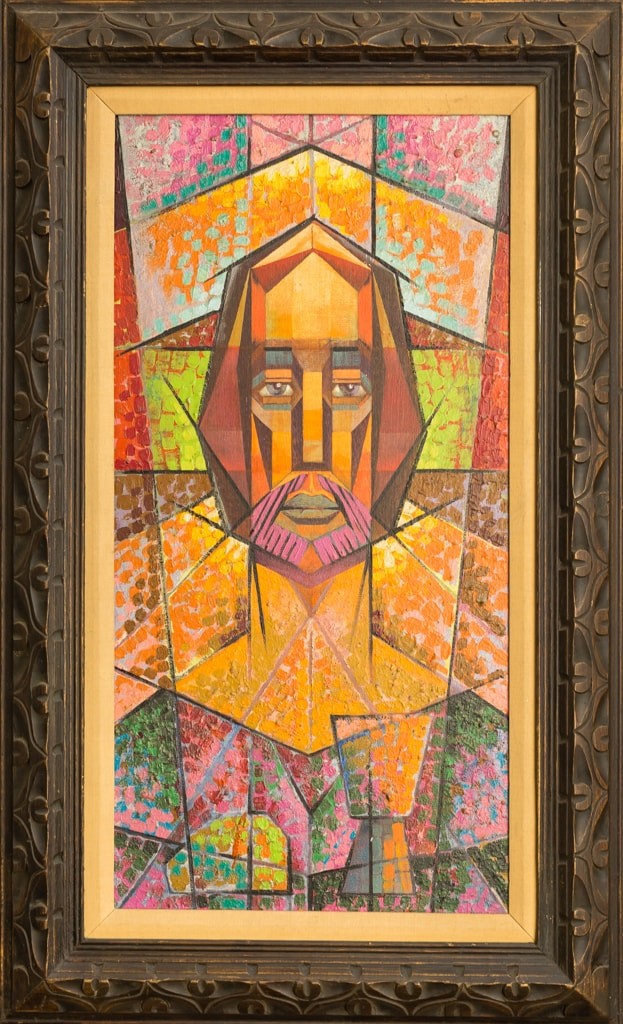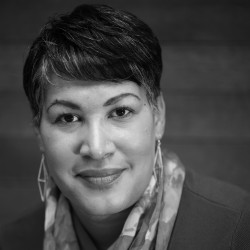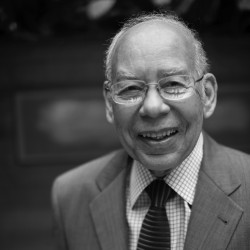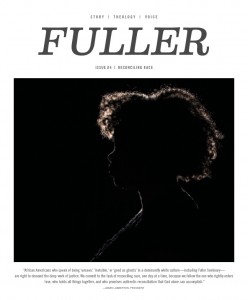What follows in this theology section is a continuance of ongoing conversations around racial reconciliation. This is not new to Fuller any more than it is resolved. We have gathered voices from our community and our friends on this long and sometimes treacherous road: voices that have been heard before but not often enough; new voices of change, of instruction, and of surprising hope; voices of pain. Fuller Forum+ guest theologian Walter Brueggemann says that “pain brought to speech turns to energy, and pain not brought to speech turns to violence.” We have seen the truth of this proven too often, too recently, with heartbreak. We choose energy and not violence.
Fuller Associate Professor of New Testament Love Sechrest moderated a recent event called “Do Black Lives Really Matter?”+ She urged, “Everyone has pain. We have to start by bearing it. We should not leap too quickly to the idea of reconciliation,” as if all that is required is a willingness to hug it out. Sechrest made the convicting observation that evangelicalism is ground zero for racial segregation in the American church, and that Fuller bears the responsibility of leadership in addressing this injustice. “Us—right here—this is the belly of the beast,” she told a rapt audience in her closing comments. “I am not about guilt. I am about building allies. We need your work, we need your labor, we need your tears, we need your hugs. Come on board.” Her challenge ended the evening and reframed our work ahead.
Brueggemann believes the groans and cries of Hebrews enslaved by Egypt “summoned God into their narrative.” As we put our own pain to speech, the incarnation of God is the transcendent energy that we evoke. God’s love for the world, born into our story, is our only hope for a victory as radical as racial reconciliation. William E. Pannell and Joy J. Moore, guest partners for this section, represent Fuller’s institutional will to continue on this road together—inadequate as we all are to the journey. We humbly give speech to our pain and energy to our convictions as allies in this ongoing work at Fuller and the wider world it exists to equip.
+ Quotes from the “Do Black Lives Really Matter?” panel—sponsored by the ASC Diversity Committee and the Black Seminarians Council—and from the Fuller Forum are scattered throughout this section. The Fuller Forum is available in its entirety here.
RECONCILIANDONO LA RAZA
Lo que sigue en esta sección de teología es una continuación persistente de las conversaciones sobre la reconciliación racial. Esto no es nuevo para Fuller, así como aun no está resuelta. Hemos reunido las voces de nuestra comunidad y nuestras amistades en este largo y a veces incierto camino: voces que se han escuchado antes pero no con la frecuencia suficiente; nuevas voces del cambio, de instrucción y de una esperanza sorprendente; voces de dolor. El invitado especial del Foro de Fuller, el teólogo Walter Brueggemann, dice que “el dolor transmitido por la voz se convierte en energía, y el dolor sin ser transmitido por la voz se convierte en violencia.” Hemos visto esta verdad demostrada con demasiada frecuencia, y últimamente, con angustia. Elegimos energía y no violencia.
Love Sechrest, profesora asociada de Nuevo Testamento en Fuller, moderó un evento reciente llamado “¿Las Vidas Negras Realmente Tienen Importancia?” Ella instó, “Toda persona tiene dolor. Tenemos que empezar llevándolo. No deberíamos apresurarnos en brincar directamente a la idea de la reconciliación,” como si todo lo que se requiere es la voluntad de abrazarnos y que con eso fuera suficiente. Sechrest hizo la observación convincente de que el evangelicalismo es la zona central de la segregación racial en la iglesia estadounidense, y que Fuller tiene la responsabilidad de liderazgo para abordar tal injusticia. “Nosotros y Nosotras—aquí en este lugar—este es el vientre de la bestia,” dijo Love Sechrest en su comentario de cierre a un público extático. “No estoy interesada en la culpa. Quiero formar alianzas. Necesitamos su esfuerzo, necesitamos su labor, necesitamos sus lágrimas, necesitamos sus abrazos. Vengan a bordo.” Su desafío terminó la noche y reformuló el trabajo que nos queda por delante.
Brueggemann cree que los gemidos y los gritos del pueblo Hebreo esclavizado por Egipto “convocó a Dios en su propia narrativa.” A medida que otorguemos voz a nuestro dolor, la encarnación de Dios es la energía trascendente que evocamos. El amor de Dios por el mundo, nacido en nuestra historia, es la única esperanza de victoria radical para una radical reconciliación racial. William E. Pannell y Joy J. Moore, colaboradores por invitación para esta sección, representan la voluntad institucional de Fuller para continuar en este camino en unidad— a pesar de que seamos insuficientes en este caminar. Humildemente damos voz a nuestro dolor y energía a nuestras convicciones en alianza a este continuo trabajo en Fuller y la comunidad global, la cual existe para equipar.
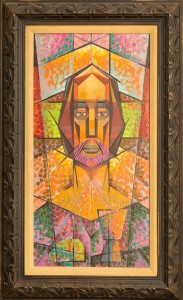
인종간의 화해하기
이번 호 신학란에서는 계속 진행 중인 인종 간 화해에 관한 대화가 이어집니다. 풀러가 이에 관한 대화를 계속해 온 것처럼, 이 주제는 우리에게 그리 새로운 것이 아닙니다. 인종 간 화해라는 멀고도 때로는 위험한 여정에 동참하고 있는 우리 공동체와 동료들로부터 우리는 다양한 견해들을 모았습니다. 전에도 듣긴 했지만, 충분히 자주 듣지는 못했던 목소리들 말입니다. 그것은 변화를 위한 새로운 소리이고, 우리를 안내하는 소리이며, 놀라운 소망의 소리입니다. 때로는 고통의 소리이기도 합니다. 풀러 포럼의 강연자였던 월터 부르그만(Walter Brueggemann)은 “말로 표출된 고통은 에너지로 전환되고, 그렇지 못한 고통은 폭력으로 변한다.”고 말합니다. 안타깝게도 이것이 사실임을 빈번하게, 그리고 최근까지 목격하고 있습니다. 우리는 폭력 대신에 에너지를 선택합니다.
풀러의 러브 시크레스트(Love Sechrest) 신약학 교수는 최근에 열렸던 행사인 “흑인의 삶이 정말 중요합니까?”의 진행을 맡았습니다. 시크레스트(Love Sechrest) 교수는 이렇게 강력히 권고했습니다. “우리는 모두 고통을 겪습니다. 이 사실을 받아들이는 것부터 시작해야 합니다. 마치 우리에게 포용하려는 의지만 있으면 모든 것이 해결 되는 것처럼, 너무 성급하게 화해를 이야기해서는 안 됩니다.” 시크레스트(Sechrest) 교수는 복음주의가 미국교회에서 인종 분리를 자행한 장본인이며, 풀러는 이런 불의를 공론화하는 일에 지도력을 발휘할 책임이 있다고 비평했습니다. 그녀는 폐회사에서 고무된 청중을 향해 “우리—바로 여기 있는—우리들의 책임입니다.”라고 말했습니다. “저는 여러분을 책망하려는 것이 아닙니다. 여러분들의 동참을 촉구하고 있는 것입니다. 우리는 여러분의 헌신과 노력, 눈물, 그리고 격려가 필요합니다. 함께 일합시다!” 이러한 그녀의 강력한 도전으로 행사는 마무리됐고, 우리 앞에 놓인 과제를 다시 정의하게 했습니다.
부르그만(Brueggemann)은 이집트에서 포로생활을 하던 히브리 백성들의 신음과 울부짖음이 마침내 “하나님을 불러 그들의 이야기 속으로 오시도록 했다”고 믿습니다. 고통을 말로 표출시킬 때, 하나님의 현현인 초월적 에너지를 불러일으킵니다. 이 세상을 위한 하나님의 사랑은 우리의 이야기가 되었으며, 인종 간 화해와 같은 급진적인 승리를 이끌어낼 수 있는 우리의 유일한 소망인 것입니다. 풀러는 인종 간 화해를 위해 미흡하나마 계속 협력해 나갈 것이며, 이를 위해 윌리엄 패넬(William E. Pannell)과 죠이 무어(Joy J. Moore)가 신학란의 객원 필진으로 동참했습니다. 우리는 인종 간 화해를 위한 사역에 헌신하는 동역자로서 겸손히 우리의 고통을 말로 표출시키고, 우리의 확신에 힘을 불어넣을 것입니다. 이것이 더 넓은 세상을 섬기기 위해 풀러가 존재하는 이유입니다.
+ This painting will be recognized by decades of students, alumni, and faculty familiar with the hallway outside the Geneva Room on the second floor of Payton Hall at Fuller’s Pasadena campus. Faintly cubist in style and palette, the brightly colored portrait seems to depict Christ outside racial boundaries. The Savior’s features, illuminated by a shaft of light from above, are multifaceted and multiethnic—an apt mirror of those to whom he offers the communion of his incarnational sacrifice. It is not a surprising statement to find adorning the walls at Fuller for so many years (with its dated frame and liner), art with a history few remember, but a story current as ever. (If you have information regarding this painting, please send a message to [email protected].)

